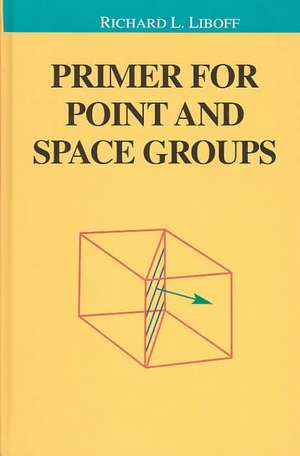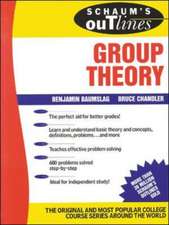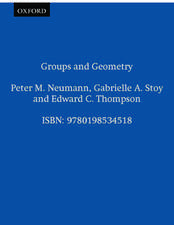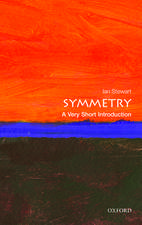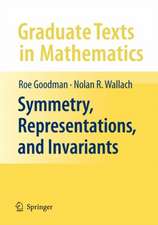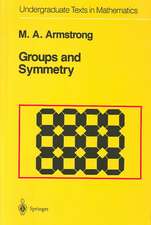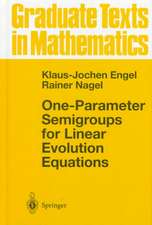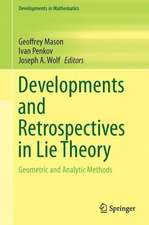Primer for Point and Space Groups: Undergraduate Texts in Contemporary Physics
Autor Richard Liboffen Limba Engleză Hardback – 18 dec 2003
| Toate formatele și edițiile | Preț | Express |
|---|---|---|
| Paperback (1) | 384.70 lei 43-57 zile | |
| Springer – dec 2010 | 384.70 lei 43-57 zile | |
| Hardback (1) | 392.21 lei 43-57 zile | |
| Springer – 18 dec 2003 | 392.21 lei 43-57 zile |
Preț: 392.21 lei
Nou
Puncte Express: 588
Preț estimativ în valută:
75.05€ • 78.56$ • 62.46£
75.05€ • 78.56$ • 62.46£
Carte tipărită la comandă
Livrare economică 31 martie-14 aprilie
Preluare comenzi: 021 569.72.76
Specificații
ISBN-13: 9780387402482
ISBN-10: 0387402489
Pagini: 220
Ilustrații: XIV, 220 p.
Dimensiuni: 155 x 235 x 14 mm
Greutate: 0.51 kg
Ediția:2004
Editura: Springer
Colecția Springer
Seria Undergraduate Texts in Contemporary Physics
Locul publicării:New York, NY, United States
ISBN-10: 0387402489
Pagini: 220
Ilustrații: XIV, 220 p.
Dimensiuni: 155 x 235 x 14 mm
Greutate: 0.51 kg
Ediția:2004
Editura: Springer
Colecția Springer
Seria Undergraduate Texts in Contemporary Physics
Locul publicării:New York, NY, United States
Public țintă
Lower undergraduateCuprins
1 Groups and Subgroups.- 1.1 Definitions and Basics.- 1.2 Group Table.- 1.3 Rearrangement Theorem.- 1.4 Building Groups. Subgroups.- Summary of Topics for Chapter 1.- Problems.- 2 Classes and Platonic Solids.- 2.1 Conjugate Elements.- 2.2 Classes.- 2.3 Direct Product.- 2.4 Cnv and Dn Groups.- 2.5 Platonic Solids. T, O and I Groups.- Summary of Topics for Chapter 2.- Problems.- 3 Matrices, Irreps and the Great Orthogonality Theorem.- 3.1 Matrix Representations of Operators.- 3.2 Irreducible Representations.- 3.3 Great Orthogonality Theorem (GOT).- 3.4 Six Important Rules.- 3.5 Character Tables. Bases.- 3.6 Representations of Cyclic Groups.- Summary of Topics for Chapter 3.- Problems.- 4 Quantum Mechanics, the Full Rotation Group, and Young Diagrams.- 4.1 Application to Quantum Mechanics.- 4.2 Full Rotation Group O(3).- 4.3 SU(2).- 4.4 Irreps of O(3)+ and Coupled Angular Momentum States.- 4.5 Symmetric Group; Cayley’s Theorem.- 4.6 Young Diagrams.- 4.7 Degenerate Perturbation Theory.- Summary of Topics for Chapter 4.- Problems.- 5 Space Groups, Brillouin Zone and the Group of k.- 5.1 Cosets and Invariant Subgroups. The Factor Group.- 5.2 Primitive Vectors. Braviais Lattice. Reciprocal Lattice Space.- 5.3 Crystallographic Point Groups and Reciprocal Lattice Space.- 5.4 Bloch Waves and Space Groups.- 5.5 Application to Semiconductor Materials.- 5.6 Time Reversal, Space Inversion and Double Space Groups.- Summary of Topics for Chapter 5.- Problems.- 6 Atoms in Crystals and Correlation Diagrams.- 6.1 Central-Field Approximation.- 6.2 Atoms in Crystal Fields.- 6.3 Correlation Diagrams.- 6.4 Electric and Magnetic Material Properties.- 6.5 Tensors in Group Theory.- Summary of Topics for Chapter 6.- Problems.- 7 Elements of Abstract Algebra and the Galois Group.- 7.1 IntegralDomains, Rings and Fields.- 7.2 Numbers.- 7.3 Irreducible Polynomials.- 7.4 The Galois Group.- Symbols for Chapter 7.- Summary of Topics for Chapter 7.- Problems.- Appendix A: Character Tables for the Point Groups.- Bibliography of Works in Group Theory and Allied Topics.
Recenzii
From the reviews:
"I teach a course which involves symmetry and point groups so I was especially pleased to have been asked to do this review. … The material is covered succinctly but in surprising depth for the size of the volume. … The text is clear throughout and the nomenclature is consistent. … It is more likely to provide a solid background for researchers and postgraduate students entering a new field or undergraduates dealing with advanced topics which are especially group theory intensive." (Contemporary Physics, Vol. 46 (4), July-August, 2005)
"This small volume may prove most useful to the lecturer in symmetry and/or group theory who will find many brief, interesting, and unusual ideas and approaches to many of different topics. … The individual chapters are followed by interesting questions that are designed to extend the applications discussed in the chapter. … Again these questions will surely prove useful to the lecturer for future lectures and exams!" (Gary J. Long, Fernande Grandjean, Physicalia, Vol. 57 (3), 2005)
"Liboff’s book provides a general introduction to the subject with applications in quantum mechanics and solid state physics. … A distinguishing feature of the book is the generous use of figures and illustrations … . The book could be used in a short course on group theory or to supplement courses on quantum mechanics or solid state physics. It also provides a relatively painless introduction to the subject for those who need to learn it later in life." (Serdar Kuyucak, The Physicist, Vol. 41 (5), 2004)
"Written in the spirit of Liboff’s text on quantum mechanics, the book is an introductory text for undergraduates in physics, engineering, materials science, and chemistry. With its selection and arrangement of examples, the book traces at every turn the physical implications of abstract concepts. It provides a solid background for those students who expect to use group theoryin nuclear and particle physics and other specific applications." (Zentralblatt für Didaktik der Mathematik, Mai, 2004)
"This text, a part of the series Undergraduate Texts in Contemporary Physics, is intended as an introductory book on group theory for undergraduates in materials science, electrical engineering, physics, chemistry, physical chemistry, and applied mathematics. … Overall, this text will probably be useful as a reference to those in physics, materials science, and applied mathematics … . The text would be … useful for those involved in the advanced study of solid state materials, as this tends to be the focus of the work." (Christopher Stromberg, Theoretical Chemistry Accounts, Vol. 115 (1), 2006)
"I teach a course which involves symmetry and point groups so I was especially pleased to have been asked to do this review. … The material is covered succinctly but in surprising depth for the size of the volume. … The text is clear throughout and the nomenclature is consistent. … It is more likely to provide a solid background for researchers and postgraduate students entering a new field or undergraduates dealing with advanced topics which are especially group theory intensive." (Contemporary Physics, Vol. 46 (4), July-August, 2005)
"This small volume may prove most useful to the lecturer in symmetry and/or group theory who will find many brief, interesting, and unusual ideas and approaches to many of different topics. … The individual chapters are followed by interesting questions that are designed to extend the applications discussed in the chapter. … Again these questions will surely prove useful to the lecturer for future lectures and exams!" (Gary J. Long, Fernande Grandjean, Physicalia, Vol. 57 (3), 2005)
"Liboff’s book provides a general introduction to the subject with applications in quantum mechanics and solid state physics. … A distinguishing feature of the book is the generous use of figures and illustrations … . The book could be used in a short course on group theory or to supplement courses on quantum mechanics or solid state physics. It also provides a relatively painless introduction to the subject for those who need to learn it later in life." (Serdar Kuyucak, The Physicist, Vol. 41 (5), 2004)
"Written in the spirit of Liboff’s text on quantum mechanics, the book is an introductory text for undergraduates in physics, engineering, materials science, and chemistry. With its selection and arrangement of examples, the book traces at every turn the physical implications of abstract concepts. It provides a solid background for those students who expect to use group theoryin nuclear and particle physics and other specific applications." (Zentralblatt für Didaktik der Mathematik, Mai, 2004)
"This text, a part of the series Undergraduate Texts in Contemporary Physics, is intended as an introductory book on group theory for undergraduates in materials science, electrical engineering, physics, chemistry, physical chemistry, and applied mathematics. … Overall, this text will probably be useful as a reference to those in physics, materials science, and applied mathematics … . The text would be … useful for those involved in the advanced study of solid state materials, as this tends to be the focus of the work." (Christopher Stromberg, Theoretical Chemistry Accounts, Vol. 115 (1), 2006)
